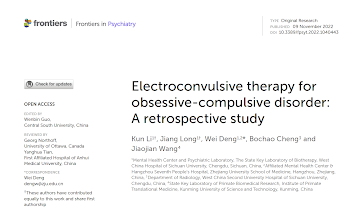ECT For OCD: Retrospective Case Series From China
Out on PubMed, from authors in China, is this study:
Electroconvulsive therapy for obsessive-compulsive disorder: A retrospective study.
Front Psychiatry. 2022 Nov 9;13:1040443. doi: 10.3389/fpsyt.2022.1040443. eCollection 2022.PMID: 36440390

The abstract is copied below:
Background: Chronic mental diseases such as obsessive-compulsive disorder (OCD) are associated with a high disability rate. Some patients still do not improve their symptoms even with adequate cognitive-behavioral therapy and drug treatment. In the treatment of OCD, electroconvulsive therapy (ECT) is not considered a neuromodulation modality with sufficient evidence.
Objective: This retrospective study aimed to determine the efficacy and associated risk factors of ECT in OCD patients.
Materials and methods: The study included 21 OCD patients who underwent ECT at a high-volume center in China between January 2009 and December 2020. The demographics and clinical characteristics of the patients were assessed using descriptive statistics. Based on Clinical Global Impressions-Improvement scale, patients were categorized into response and non-response groups. Clinical and demographic characteristics of two groups of patients were compared.
Results: An analysis of 21 patients was conducted. In total, 12 patients (57.1%) responded to ECT, 11 patients (52.4%) reported side effects, and an average of 7 ECT sessions were administered. In terms of demographic, there was no statistically significant difference between the two groups. It is noteworthy that the non-response group reported more depression and schizophrenia related disorders comorbidities than the response group (χ2 = 6.252, P = 0.041).
Conclusion: The effectiveness of ECT in treating OCD is limited, especially in patients with refractory symptoms. Comorbidity with other mental disorders may affect the efficacy of ECT.
Keywords: comorbidity; efficacy; electroconvulsive therapy; obsessive-compulsive disorder; refractory.
The pdf is here.
And from the text:
There is not much here, but any contribution to the literature on the effectiveness of ECT for OCD is welcome.
This report also suffers from the usual discrepancy between good results and lukewarm description in the text; a 57% response rate (in a very difficult and refractory patient population) is actually pretty good.
Senior clinicians know that ECT works well in some patients with OCD, and is obviously far less invasive than DBS. For whatever reason, the good (but not excellent) effects of ECT in OCD have never been broadly accepted.






Comments
Post a Comment